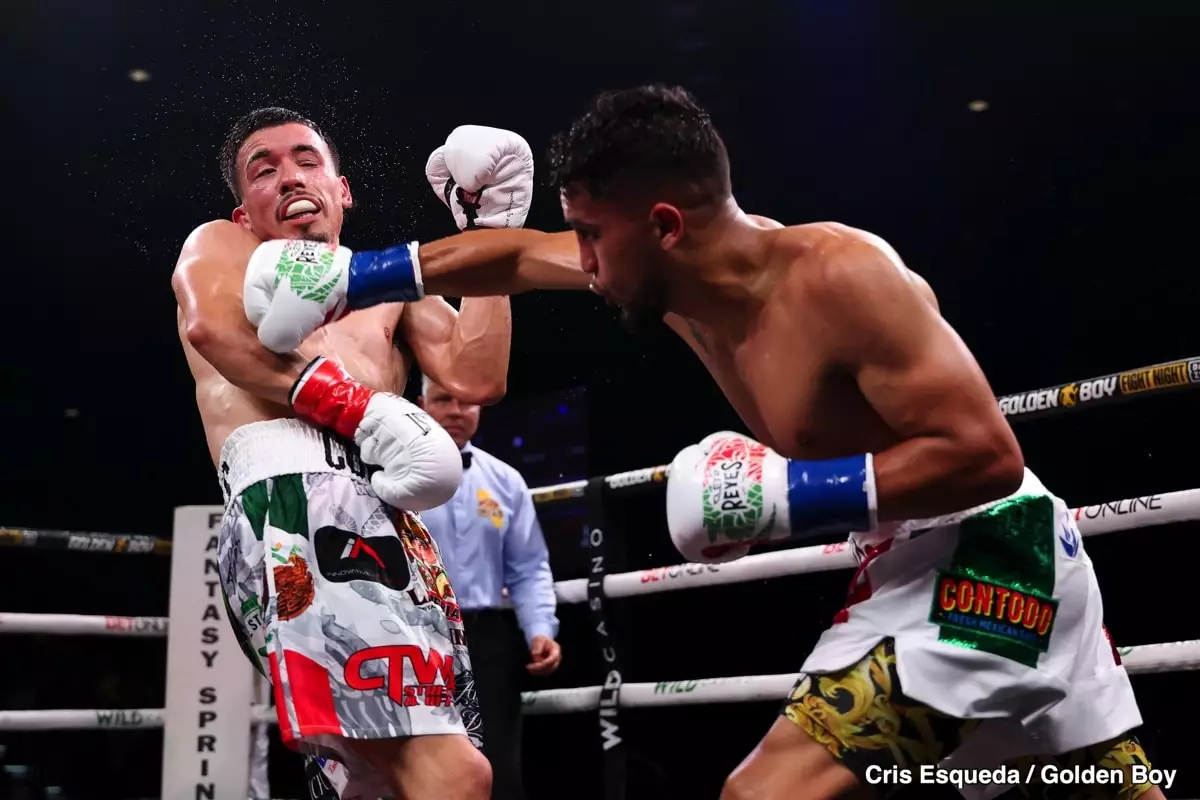Few moments in boxing evoke the raw emotion and relentless debate quite like a disputed decision. The recent event at Fantasy Springs showcased everything that makes boxing both captivating and infuriating. Two fighters, Manuel “Gucci Manny” Flores and Jorge Chavez, battled fiercely for ten rounds, leaving the audience on the edge of their seats, yet the judges’ scorecards robbed the viewers of a decisive outcome. The judges awarded a majority draw with scores of 93-97, 95-95, and 95-95, a result that seemed to frustrate everyone involved—fighters, fans, and commentators alike.
Chavez’s reaction summed up the collective sentiment: disbelief and frustration. To be awarded a draw under these circumstances appeared unjust, especially considering the nature of the fight—one where Chavez believed he clearly outpaced his opponent. His accusations towards the judges—questioning their focus and criticizing their apparent indifference—highlight a universal concern in combat sports: the integrity of scorecards. When fighters feel they’ve dominated, only to see their efforts dismissed by potentially inattentive or biased judging, trust in the sport diminishes. The judges’ reluctance to make a clear call raises questions about professionalism, impartiality, and the standards we hold for officiating big bouts.
Chavez’s claim that a headbutt was responsible for his facial cut exemplifies the blurred lines that often surround judging narratives. Meanwhile, Flores defended his approach, suggesting Chavez ran the entire fight, making it difficult for him to land significant punches. The fighters’ conflicting perspectives reflect a broader issue—what does a ‘close fight’ truly look like? In this case, it’s clear that both men had their own interpretations, but the judges’ decision failed to reflect a consensus either within the ring or among the viewers.
Rather than debating semantics or point-scoring, perhaps the central issue lies in how subjective scoring can be. An imperfect system, especially when the judges themselves seem disengaged or disconnected from the action, undermines the sport’s credibility. A rematch seems inevitable; however, the true fix would lie in bringing consistency and accountability to judging panels, so fighters and fans can trust that decisions stem from a fair and attentive assessment of the fight.
The Undercard: A Night of Surprises and Rising Stars
While the main event was marred by controversy, the night’s undercard delivered a refreshing dose of clarity and excitement. Farid Ngoga’s victory over Jordan Panthen was clear, decisive, and well-deserved. Ngoga’s calm boxing, combined with strategic patience, overwhelmed Panthen—an overly hyped fighter whose aggressive approach did little to sway the judges or change the tide of the fight. Ngoga’s majority decision confirmed his growing reputation as a skilled and intelligent boxer, a promising prospect for those seeking a new face in the welterweight scene.
Meanwhile, several fighters continued to climb the ranks with impressive performances. Grant Flores showcased resilience and finishing ability, stopping Todd Manuel in just two rounds—an injury-induced TKO that preserved his undefeated record. Coxed by an early body shot, Manuel was unable to continue, but Flores’s performance reinforced his potential to become a serious contender in the super welterweight division. Similarly, Cayden Griffiths maintained his unbeaten streak, stopping David Ramirez with a sharp hook in the fourth round. At only six fights into his career, Griffiths has shown the power and confidence necessary to make waves.
Leonardo “Bazooka” Sanchez demonstrated why he lives up to his nickname—unloading a relentless barrage that finished Abraham Valdez in the fourth round. The referee’s quick intervention, possibly influenced by a desire to protect Valdez, still resulted in another stoppage for Sanchez’s burgeoning record. It’s clear that his aggressive style and finishing instincts could make him a dangerous wildcard if he continues developing under the right guidance. Fabian Guzman rounded out the notable performances with a unanimous decision over Brian Arregui, a demonstration that sometimes, consistency and technique shine through in the judges’ eyes, providing a much-needed sense of normalcy amid the chaos.
The prelims offered their own drama, with Bryan Lua and Kevin Piedrahita fighting to a draw in an evenly matched contest. The judges’ split decision, with two scoring it even and one leaning toward Lua, underscored the effort both men put forth—yet left the outcome feeling ambiguous, a reflection of the night’s overall unpredictability. In stark contrast, Javier Meza’s methodical victory over Cesar Villarraga offered clarity and professionalism, reminding us that boxing still values straightforward, decisive performances when administered fairly.
Reflections: The Broader Implications of a Night Marked by Clash and Controversy
This event served as a microcosm of boxing’s inherent contradictions. On one hand, the sport’s unpredictability and the fighters’ passion keep fans engaged, fostering memorable moments. On the other, inconsistent judging and subjective interpretations threaten the integrity of the sport we love. The draw between Flores and Chavez might be a catalyst for reform—perhaps stronger judging standards or technological aids like instant replay could prevent such令人扼腕的结果 from occurring again.
The fighters’ comments reveal a deeper philosophical divide: Chavez’s perception that Flores lacks power versus Flores’s belief that Chavez was merely hesitant or running away. These contrasting philosophies form the core of stylistic debates—whether aggressive offense or tactical evasiveness wins the day. Yet, without a trustworthy judging system, these debates tend to become heated arguments rather than objective assessments.
This night leaves us pondering whether boxing can truly evolve into a sport that balances entertainment, fairness, and accountability. Fighters deserve a fair shot to demonstrate their skills, and fans deserve the confidence that victories are won legitimately. As the sport continues to confront its judging dilemmas, it must also embrace transparency and innovation—only then can it truly harness the spectacle’s immense power to inspire and captivate with integrity.

